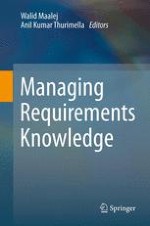2013 | OriginalPaper | Buchkapitel
17. Managing Requirements Knowledge: Conclusion and Outlook
verfasst von : A. K. Thurimella, W. Maalej
Erschienen in: Managing Requirements Knowledge
Verlag: Springer Berlin Heidelberg
Aktivieren Sie unsere intelligente Suche, um passende Fachinhalte oder Patente zu finden.
Wählen Sie Textabschnitte aus um mit Künstlicher Intelligenz passenden Patente zu finden. powered by
Markieren Sie Textabschnitte, um KI-gestützt weitere passende Inhalte zu finden. powered by
